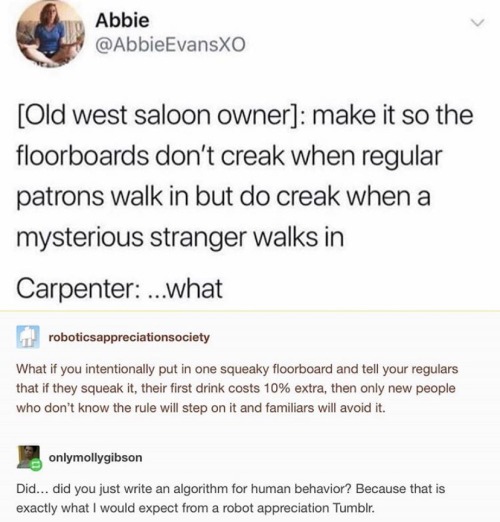I’m Reading 病案本 Bing An Ben (Case File Compendium)!
I’m reading 病案本 Bing An Ben (Case File Compendium)!
As of ch 30 (of 254), it’s reading as a super slow burn with all the usual romantic tropes, except that the two protagonists hate each other.
They work together and successfully save the day! But they hate each other.
There is only 1 bed! But they still hate each other.
Trapped on a rainy night in a cave on a romantic island with nothing but a book of love confessions and condoms! But … they hate each other.
One gets sick and the other nurses him back to health! Wait… they still hate each other?
The other gets sick and forcibly kisses the one in his delirium! … Why do they Still hate each other?
Anyway, I am enjoying it. They’ll start to like each other eventually, I’m sure.
More Posts from Weishenmewwx and Others
The Husky and His White Cat ShiZun, volume TWO 2 二
(The one with the very pale cover)
(English 7Seas version) Notes 3 of 4
Pages 208-327

More under the cut.









Back to my Masterlist.
So, I think I’m done annotating my copy of First Edition MDZS, Volume 1.
Thanks to Suibian Subs and Scans and @baobeibuns’ Twitter thread (https://twitter.com/baobeibuns/status/1495228005026648067), I penciled in missing lines and corrected a bunch of little mis-translations.
I also re-translated a bunch of words that I felt weren’t conveying the correct feeling, and added a few explanatory notes in places that I remember being super confused.
Here is Part 1, through page 65:









Stars of Chaos 杀破狼
by Priest, translated by Seven Seas
Notes & Annotations List (by me)
I am truly impressed that Seven Seas had this translated. Major kudos to the translators. Maybe it’s just me and my not-advanced Chinese reading level, but I find the writing style of Stars/Priest-in-general to be extremely …. Juicy. Rich. Savory: if there is a 4-word phrase concisely describing something elaborately and with deep historical context, Priest will use that phrase. If Priest can refer to Character A in a manner that immediately conveys Character B's feelings and emotions about that Character A, she will use that reference style instead of any simple name or pronoun.
Sadly, none of those idioms or reference styles translate well into English.
For me, reading Priest in Chinese is like reading an epic story off a wall mural in an ancient temple, but add jewels and engravings and some filigree in precious metals, and maybe leave some imperial armor and weapons lying around to trip over while trying to decipher some crazy-long sentence punctuated only with commas, no periods or semicolons or even long dashes in sight. It's amazing, but sometimes exhausting, and especially exhausting if I finally puzzle my way through a truly difficult passage only to realize "Ah. Chang Geng is theorizing about the potential short vs long-term consequences of different types of monetary policy. Sarcastically."
Anyway, here are some notes. A few are literal translations that you would have gotten two sentences later; a few are of wordplay that I really enjoyed but which didn't survive translation. A fair number are translations that you could have looked up in the glossary, but, really, who wants to spend their time looking up "shifu" vs "shishu" for a minor unnamed character?
The more important notes are fun cultural references, and some really tricky translations that I tripped over so badly that I had to go back to the original and figure out how to explain in English.
(After reading Vol 2:) AND it looks like Priest edited and changed her work just a little bit for print translation, but I love her (pirated) online version so much that I really really want you to know what I read and how much I love it. So I added a few sentence back in.
Volume 1 (Volumes 2 and 3 and 4 below the cut)
Notes 1, pages 12 - 81
Notes 2, pages 86 - 146
Notes 3, pages 148 - 202
Notes 4, pages 203 - 245
Notes 5, pages 249 - 281
Notes 6, pages 288 - 414
Notes 7, pages 415 - end
Volume 2
Notes 1, pages 21 - 46
Notes 2, pages 48 - 62
Notes 3, pages 63 - 87
Notes 4, pages 90 - 144
Notes 5, pages 153 - 237
Notes 6, pages 263 - 333
Notes 7, pages 339 - 366
Notes 8, pages 370 - end
Volume 3
Notes 1, pages 1 - 84
Notes 2, pages 97 - 151
Notes 3, pages 152 - 265
Notes 4, pages 267 - 350
Notes 5, pages 358 - end
Volume 4
Only 24 notes for the entire book! All right here :)
Back to the Masterlist of all the books I'm making notes on.
MDZS Vol 2 Annotations, part 1
I finished annotating my copy of MDZS, Volume 2!
First off, I think the translations are perfectly wonderful and I am forever grateful that Seven Seas has given us the ability to share this story with a wider group of friends. With that, I went into Vol 2 trying to pretend that I did not speak Chinese, had little to no knowledge of Chinese culture.
Any time I saw something that didn't flow well to my North American brain or that didn't feel like what I remembered feeling when I read the Chinese version, I made a note. I love this story, and I don't expect my non-Chinese friends to remember the 5+ different things that Lan Xichen is called, or what in the world "shishu" is, so I made a lot of notes. Here they are:
MDZS Vol 2, Annotations Part 1, pages 1 - 86 (I tried to include the page number in each photo).




































@mdzsnet 24 August 2020 Lan Jingyi Birthday Event (ฅ'ω'ฅ)
AKA The Most Unlan Lan to Ever Lan
Do your followers know about Libby? It's an app where, at least in the United States, you can listen to as many professionally recorded audio books as you'd like for FREE, so long as you have a library card. You don't even need to visit the library, you can just borrow the audiobooks from your phone.
I don't know. I hope they do. But perhaps a few more of them will after reading this.


So, a rant and a request for advice before I begin my dreadfully important hunt/research:
I’ve been loving the WeComics app, originally for reading Mo Dao Zu Shi in English (before I improved and trusted my Chinese), then for a bunch of other Chinese and translated-from-Chinese manhua. I’ve barely been on tumblr recently because I’ve been head-over-heels in love with 化龙记.
And then I noticed that 化龙记 is also in English on the app as “Tale of Dragon Morph”, so I open it up and, Lo and Behold, there is more/new chapter-header art! And so many more panels that help explain the flow of the plot — it makes sense now!
But as I read the English version, I notice that it’s Missing Scenes. Useful, important scenes that help with Character Development and Logical Flow.
What’s up with these manhua? Why are there different missing scenes in each language? Is it just WeComics?
Is there a manhua app out there that is Complete?!?!?
Help!!!
—————————-
Grumpy follow-up: WeComics is being taken over by WebNovel, which doesn’t appear to have Any manhua at All 😠.
And KuaiKanManHua is typically censored. No cute images of one character washing another’s back, no super-useful panels showing how the protagonist escapes his lecherous captor’s bedroom. Nope.
Sigh. I will keep searching.
Stars of Chaos 杀破狼
Volume 3, pages 1-84
First, let us all show our appreciation for the illustrator who put horrified soldiers in the background when Gu Yun is about to play a little song on his jade flute:

(sorry my color balance is all wacky. Please pretend you see the lovely blue sky and the snowy white robes.)

(The "yet" confused me, so I changed it to an "And.")

...to land in a kneeling position, all cool-like.

In Chinese, the phrase equivalent to "snatch from the jaws of death" is "从阎王那里抢回了..." = "snatched back from (the Ruler of the Underworld) Yan Wang (or Yanluo Wang)."

In English, it's "harbor improper intentions," but that makes me feel like someone is going to seduce and then abandon someone else; whereas in Chinese, the phrase is "心怀不轨,” which is more along the lines of "intentions that do not follow the proper rules." 'Cuz god-sons are not supposed to think romantic thoughts about their god-fathers.

The “bei" here is the word for "North". 北。
And does anyone else like to laugh at how Chang Geng's new title, 雁王 Yàn Wáng, is now a homophone of the Ruler of the Underworld 阎王 Yánwang ?

天地没良心。 Heaven and Earth do not have a conscience / kindness.

It's super minor, but I was a little confused until I re-worded this in my brain to be "My actions here are not done out of my filial obligation to you; these actions are just me doting on you."
Chang Geng is not being disrespectful by denying filial piety to a godfather, but, rather, he is showing that he is doting on Gu Yun as a lover.

急行军 is translated as "forced march" in my pre-installed iphone Dictionary, but the Chinese explanation is "in order to complete an urgent task as quickly as possible, act with the utmost speed."
So I understand "急行军中实在被他们弄得基恩恼火” as "it was infuriating to have to deal with them while we were in such a terrible rush."
My DanMei Literary Adventure Masterpost
Stars of Chaos - All Notes Links

Now you know — view on Instagram https://ift.tt/3AGm34f
-
 redowox reblogged this · 1 month ago
redowox reblogged this · 1 month ago -
 redowox reblogged this · 1 month ago
redowox reblogged this · 1 month ago -
 redowox liked this · 1 month ago
redowox liked this · 1 month ago -
 ai-the-broccoli liked this · 4 months ago
ai-the-broccoli liked this · 4 months ago -
 greenblue4ever liked this · 5 months ago
greenblue4ever liked this · 5 months ago -
 faetookmyname liked this · 5 months ago
faetookmyname liked this · 5 months ago -
 talk-danmei-to-me reblogged this · 5 months ago
talk-danmei-to-me reblogged this · 5 months ago -
 vilrocker400 liked this · 5 months ago
vilrocker400 liked this · 5 months ago -
 weishenmewwx reblogged this · 5 months ago
weishenmewwx reblogged this · 5 months ago
